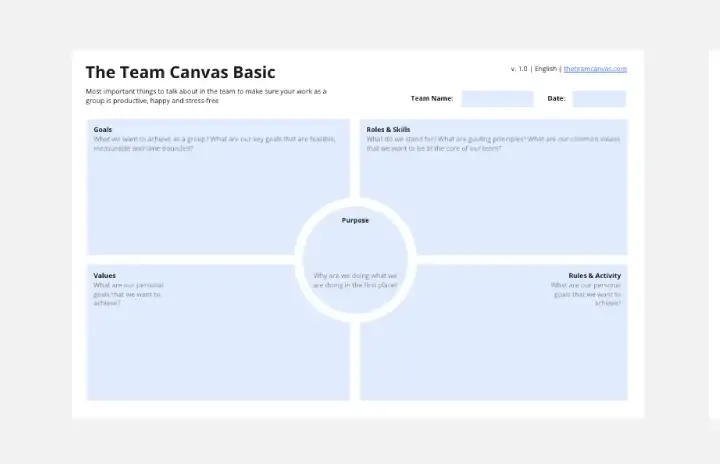The Team Canvas (Basic)
The Team Canvas Basic is a short 30 to 45 minute version of the Team Canvas framework that is suitable for starting new teams, aligning on common vision and basic agreements. It is pretty fast and works best on short projects, or when a new member joins the team.
When to use The Team Canvas
Based on our experience with startups and creative groups, it is made to smoothly start collective projects, let people learn about each other and accumulate enough momentum to get going.Team Canvas Basic works best at the following touch points:
creating a team;
kicking off a project;
welcoming new team member (e.g. freelancer joining the team);
basic team alignment meeting.
How does The Team Canvas work?
You’ll be guided through 5 key concepts:
Purpose: What is the team's purpose: the Why behind your goals? 5 mins
Goals: What are the goals for the whole team, as well as for each team member? 5 mins
Values: What are the core values that you share as a team? 5 mins
Roles & Skills: What are the roles and corresponding skills that each member brings to the table? 5 mins
Rules & Activities: What are the ground rules that you want to agree on? How are you going to communicate? How would you make your decisions? How are you going to plan, execute and evaluate them? 5 mins
This template was created by Alex Ivanov.
Get started with this template right now.
Startup Canvas Template
Works best for:
Leadership, Documentation, Strategic Planning
A Startup Canvas helps founders express and map out a new business idea in a less formal format than a traditional business plan. Startup Canvases are a useful visual map for founders who want to judge their new business idea’s strengths and weaknesses. This Canvas can be used as a framework to quickly articulate your business idea’s value proposition, problem, solution, market, team, marketing channels, customer segment, external risks, and Key Performance Indicators. By articulating factors like success, viability, vision, and value to the customer, founders can make a concise case for why a new product or service should exist and get funded.
SaaS Implementation Timeline
Works best for:
Agile
The SaaS Implementation Timeline template offers a visual roadmap for planning and tracking the implementation of Software as a Service (SaaS) solutions. It provides a structured framework for defining milestones, allocating resources, and monitoring progress. This template enables organizations to manage SaaS deployments effectively, ensuring successful adoption and realization of business value. By promoting transparency and accountability, the SaaS Implementation Timeline empowers teams to deliver projects on time and within budget, driving organizational agility and competitiveness.
Agile Retrospective
Works best for:
Retrosprective, Agile Methodology, Meetings
The Agile Retrospective template offers a dynamic and adaptive framework for teams practicing agile methodologies. It provides elements for reflecting on sprint performance, identifying bottlenecks, and planning improvements. This template enables teams to adapt and refine their processes continuously, fostering a culture of learning and innovation. By promoting agility and adaptability, the Agile Retrospective empowers teams to optimize their workflows, drive continuous improvement, and deliver value to their stakeholders effectively.
Retrospective in the Island of Golocans
Works best for:
Retrospectives, Meetings, Agile Methodology
The Retrospective in the Island of Golocans template offers a creative and imaginative setting for retrospectives, transporting participants to a fictional island setting. It provides elements for reflecting on past iterations, sharing insights, and brainstorming improvements. This template enables teams to step outside their usual environment and approach retrospectives with a fresh perspective. By promoting creativity and storytelling, the Retrospective in the Island of Golocans empowers teams to engage in meaningful discussions, generate new ideas, and foster a culture of innovation effectively.
Lean Procurement Canvas
Works best for:
Agile
The Lean Procurement Canvas is a visual tool for optimizing procurement processes by applying Lean principles. It provides a structured framework for defining customer needs, identifying waste, and streamlining procurement activities. This template enables procurement teams to visualize their processes, identify improvement opportunities, and enhance efficiency and effectiveness. By promoting transparency and collaboration, the Lean Procurement Canvas empowers organizations to deliver value through optimized procurement practices.
Sprint Review Template
Works best for:
Sprint Review, Agile
The Sprint Review Template is a vital tool in Agile project management that enhances communication between team members and stakeholders by providing a clear format for presenting the sprint's accomplishments and challenges. It encourages active participation and feedback from all attendees, leading to more informed decision-making and continuous improvement. In essence, it's a catalyst for meaningful dialogue and collaborative growth.
